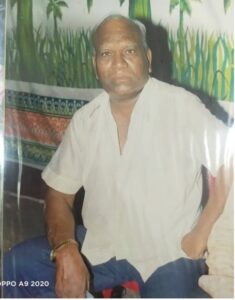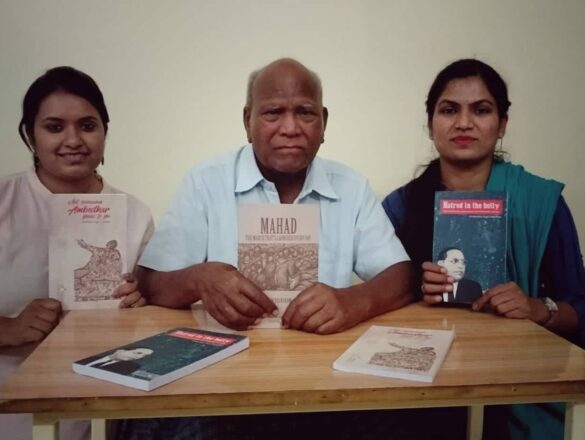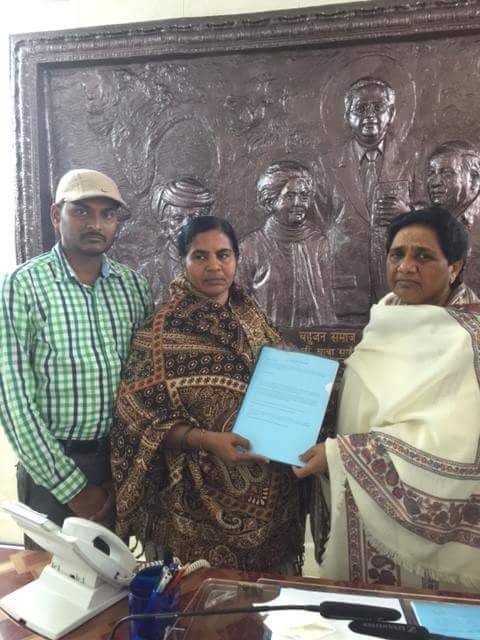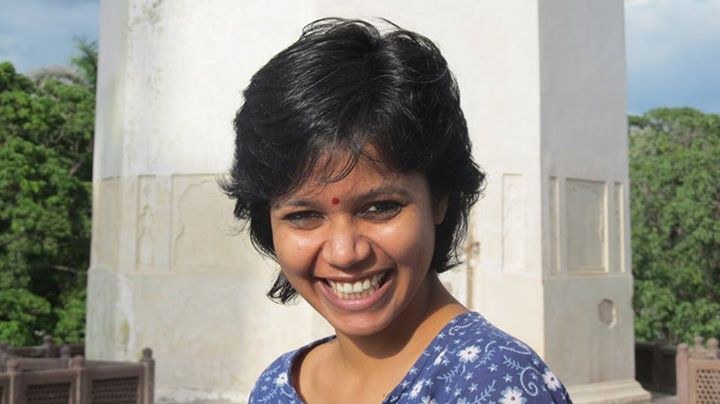Chetana Sawai
Prabuddha: Journal of Social Equality Vol 6, 2 has been published and it carries articles by women authors from anti-caste movements. SAVARI is happy to share an excerpt from: ‘Trials and Triumphs of a Pioneering Bahujan Institution Builder’ Prabuddha: Journal Of Social Equality, 6(2), 1-8
Chetana Sawai participated in the discussions held by The Shared Mirror on Bahujan perspectives on the impact of the pandemic. She spoke about her father Dinesh Sawai’s journey from childhood to emerging as a prolific institution builder serving the educational needs of rural Maharashtra. Chetana’s current concerns about the immediate and long-term impacts of the pandemic and lockdown on her students and staff form a significant portion of this talk. Further, she shares deep insights into the trials and triumphs of building autonomous minority institutions for Bahujan students.
My father and his folks lived in the village, and they never had a proper house. They lived by the riverside, close to the place where the pigs would live. Their work was to break stones on the river bank and that would earn them their two square meals. Their village was Paunar. Many of us must be aware of Vinoba Bhave, who is related to Bhoodaan movement: the land reform movement. At that time Vinoba Bhave had come to Paunar and set up his Ashram there. The Ashram was by the river and my father and his family and neighbors used to do the job of breaking stones there. Sometimes it would happen that the sound of breaking stones would disturb Vinoba Bhave and his disciples; they used to meditate or something, I never enquired about it. Since it was disturbing them they also stopped doing whatever they were doing. The caste we come from—Mahars—they are like artisans, the way Kunbis are peasants, Telis are oil pressers, Mahars were not like that. They would do whatever work they could find. When their stone breaking started disturbing Vinoba Bhave they lost their jobs and there was nothing for them to eat. What to do about those two square meals?
My grandmother used to go to Dumdum Sahib; there is a Muslim saint here, Sheikh Farid Baba, so every Monday one would roam around the village and collect flour in his name so that they could make rotis out of them and that is what sustained them. Once it so happened that they couldn’t collect enough flour to feed them. And since there was no door sometimes the dogs and cats would also take away their food. They have gone through all this and thus the kind of things I can say about myself and my privilege such as getting proper food every day, I live comfortably, I have a car, the way I am enjoying my life etc. has not been true for my father. Today, when I see his journey from a small village to building a huge infrastructure, I feel that he has the right to say that I have grown out of and surpassed very difficult circumstances.
 My father passed his class 10th from Paunar but then the question arose about the rest of his education. His elder brother was concerned saying ‘I couldn’t study but my youngest brother must get an education.’ It must have been around 1961-62 when Babasaheb’s Milind college was newly formed in Aurangabad and a lot of teachers from Aurangabad came to Vidarbha and went from village to village. They actually searched for students who wanted to study. My father’s eldest brother learnt that some people from Babasaheb’s college in Aurangabad have come and they want to teach the children here. That is how one of the teachers picked up my father and took him along to Aurangabad. He had no idea what was going to happen there, he only knew it was Babasaheb’s college and he was supposed to go there. He only had two pairs of clothes to wear, those only included half pants. He did not have footwear. They went to the college and got admission there. The first thing they got after getting admitted was their scholarship. What would they have done with that scholarship money? They bought flip flops for themselves. And then my father transitioned from half pants to full pants. All this happened in Babasaheb’s Milind college. All the people who had gone from Vidarbha to Aurangabad, including my father, had a kind of an agitation and assertion in them.
My father passed his class 10th from Paunar but then the question arose about the rest of his education. His elder brother was concerned saying ‘I couldn’t study but my youngest brother must get an education.’ It must have been around 1961-62 when Babasaheb’s Milind college was newly formed in Aurangabad and a lot of teachers from Aurangabad came to Vidarbha and went from village to village. They actually searched for students who wanted to study. My father’s eldest brother learnt that some people from Babasaheb’s college in Aurangabad have come and they want to teach the children here. That is how one of the teachers picked up my father and took him along to Aurangabad. He had no idea what was going to happen there, he only knew it was Babasaheb’s college and he was supposed to go there. He only had two pairs of clothes to wear, those only included half pants. He did not have footwear. They went to the college and got admission there. The first thing they got after getting admitted was their scholarship. What would they have done with that scholarship money? They bought flip flops for themselves. And then my father transitioned from half pants to full pants. All this happened in Babasaheb’s Milind college. All the people who had gone from Vidarbha to Aurangabad, including my father, had a kind of an agitation and assertion in them.
My entire family here in Wardha: Grandmother, great grandmother—all of them know how to operate Dandpatta, it is a kind of weapon, they also knew archery; they knew all the techniques of self-defense.
When my father went to Aurangabad, he learnt what it means to have new books. A number of incidents there made them feel that we are Ambedkarites. Last time when I had done an interview with my father along with Pradnya, he had talked about the Shanti Nagar area. There were some hut settlements which had been set up by the goons on Babasaheb’s 4 acres land. When my father and his people learnt about this my father and his friends decided to deal with this. Bhalchandra Mungekar and Yashwant Manohar were my father’s batchmates. Yashwant Manohar was a poet, so he wasn’t into agitation and into physical altercation. But my father and his friends made a gang of sorts and carried out agitation and got Babasaheb’s land vacated from those goons. I think some educational institutions were set up there later on.
Read the full article here: Sawai, C. (2022). Trials and Triumphs of a Pioneering Bahujan Institution Builder. Prabuddha: Journal Of Social Equality, 6(2), 1-8. Retrieved from https://prabuddha.us/index.php/pjse/article/view/85


